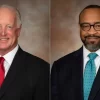By Josh Moon
Alabama Political Reporter
One by one, in the courtroom of Jefferson County Circuit Court Judge Houston Brown, the three men came to provide testimony on behalf of the Alabama Attorney General’s office, which was seeking a warrant to raid a place of business.
Weeks later, after the business had been raided and property and money seized, Judge Brown would hear evidence that the three men lied during their previous testimony. Brown would find that their lies were so egregious, so impactful, that he tossed the warrant out and ruled the property had to be returned.
A short time later, the district attorney of the county leveled charges of perjury against the three men – much the same way police officers and federal agents in other cases in other states have been charged for lying to judges in order to obtain illegal search warrants.
In Baltimore in 2012, for example, a police officer was sentenced to jail time for falsely claiming he witnessed a drug deal in order to obtain a search warrant. In Yonkers, NY, in 2015, an officer and a detective each received jail time for lying to obtain a search warrant used in a raid.
But in Alabama, instead of jail time, the three men who were indicted by a grand jury for perjury received far different treatment.
Once they were indicted, Alabama AG Luther Strange’s office invoked a rarely-used perk of the state’s top law enforcement office: They took over the case from the local DA’s office.
It’s a move usually reserved for cases in which the local office needs more resources, or if the local office lacks the expertise to prosecute the case. But in this simple perjury case, none of the usual reasons applied.
Instead, Strange’s office took over the case with one goal in mind: to drop the charges and let the agents – two from the Alcohol Beverage Control office and another expert witness – go unpunished for their lies.
That’s because these men weren’t testifying in one of the usual matters brought before a judge. This search warrant allowed the state to enter two electronic bingo casinos in Greene County and remove machines and cash.
And in electronic bingo cases, the State of Alabama has a sordid history filled with instances of ends-justify-the-means tactics that should, by now, raise serious civil rights questions.
Consider: since this fight over electronic bingo began in 2009, more state agents have faced corruption charges than casino owners or their employees; three circuit court judges, two of which were handpicked by the ALSC, have ruled that casinos in Macon and Greene counties are not only operating within the law but that Macon’s VictoryLand has been singled out for unconstitutional legal persecution; to date the state has failed to put on the stand during any trial an expert witness who has worked for any gaming company, casino, video game manufacturer, electronics company or any of the dozens of gaming regulatory agencies and companies to prove that electronic bingo machines are slot machines; and that the ALSC cannot cite case law supportive of its electronic bingo rulings, despite dozens of similar cases from all over the country.
But let’s not leave things at a broad overview. Details mater in our justice system, so let’s provide some and run through a detailed overview of this case against electronic bingo.
Part I: Corruption within the AG’s Office
It would be bad enough if during this campaign against electronic bingo the state’s top law enforcement office were to be accused by a circuit court judge, a county DA and a grand jury of utilizing perjury in order to obtain a search warrant for a bingo raid. But the problems within Luther Strange’s office have gone well beyond those issues.
With the notable exception of office’s white collar crime division – which has somehow managed to ward off the corruption that has surrounded it in its own office – Strange’s AG office has been an unmitigated mess, even by that office’s own admission.
Twice, Strange was forced to push out high-ranking, high-profile members of his staff, including a deputy AG in Sonny Regan, and a top investigator in Gene Sisson. Both were forced out after allegations that they were leaking information to former House Speaker Mike Hubbard, who was a target of the AG office’s white collar division.
Reagan and Sisson were the primary players in the state’s cases against both VictoryLand and GreeneTrack, with Sisson leading the raids and serving as the state’s primary witness and Reagan prosecuting the cases. Those cases were filled with problems.
One of the most notable issues, and a microcosm of the state’s ham-handed prosecution of electronic bingo, came during the 2014 hearing in Montgomery Circuit Court concerning machines and money seized during a raid at VictoryLand. During Sisson’s testimony, in an attempt to prove that the machines in question were slots and not electronic bingo machines, he testified that during the 2012 raid at VictoryLand, with no one else in the casino, he was able to play and win a game of bingo.
If true, that would have been a major problem for the casino, since in order to constitute an electronic bingo machine, the machines have to be connected to each other and playing against each other, not against the house like a traditional slot machine. Had Sisson been able to play alone, that would have proven that the machines were not connected.
So, how did he manage to play the machine?
As it turned out (and casino attorneys took great pleasure in pointing this out during trial) another state agent who was involved with the raid also happened to be testing one of the machines in a different part of the casino. The two agents were playing each other.
But the problems don’t stop with Sisson, Reagan and a single bungled investigation.
There were two more departures from the AG’s office, including another deputy AG, Kevin Turner, whose phone records, APR reported, showed a number of contacts with Hubbard and his close allies during Hubbard’s trial. Also, another investigator abruptly retired, another investigator who’s still working with the AG’s office was once barred from a federal gambling trial when he was an FBI agent for inappropriate conduct and a staff attorney was questioned for her possibly inappropriate relationship with a federal agent when she served as a juror during a federal gambling trial.
Head spinning?
Perjury charges. Disgraced investigators. Corrupt prosecutors. Scandal on top of scandal involving nearly everyone involved.
And then on top of it all, there’s the direct financial links between the AG’s office and the Poarch Band of Creek Indians, which reaps the benefits of operating a gambling monopoly in the state.
We’ll examine those ties in Part II: Follow the Money














































